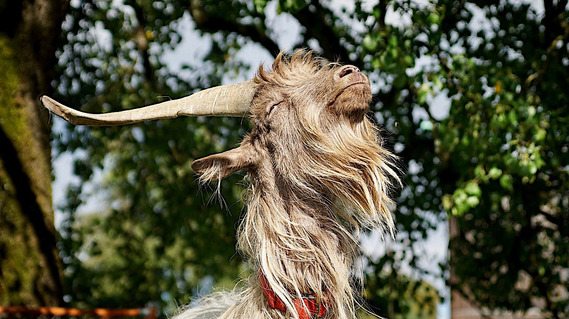We yearn for God, one more promise to come
In historical context, our lives have seen the promises of the past fulfilled. The Messiah came. He suffered the final sacrifice. He rose and ascended. And he gifts all who accept him with the Holy Spirit. God is no longer limited to an earthly temple but resides in our very selves.
Still, we yearn for God! The promises keep coming, and there’s more to fulfill. We, too, must die. We greet these coming promises from afar, knowing this life on earth is one of being a stranger and an alien.
Image by Susanne Jutzeler, Schweiz
Our yearning will be met
By John Pearring
https://bible.usccb.org/bible/readings/012823.cfm
Hebrews 11:1-2, 8-19
Mark 4:35-41
The premise for the Homeless Catholic ministry—whether the online reflections, the book: Confessions of a Homeless Catholic, or our men’s group ministry—comes down to the same craving and desire. We yearn for our home with God.
Hebrews captures the sweet sadness of that yearning.
All these died in faith.
They did not receive what had been promised
but saw it and greeted it from afar
and acknowledged themselves to be strangers and aliens on earth,
for those who speak thus show that they are seeking a homeland.
(Hebrews 11:13-14)
I am going to add that scripture to our website. It’s delicious in a liver and onions sort of way. There’s good there, but it smells uniquely terrible and weirdly inviting. It’s concocted from the fruit of the land and harvested innards. Not to push the analogy too far, but this life both stinks and harkens for a promise yet to be fulfilled. Even as we enjoy the fruits of this life, we know a better one, one where the dangers lurking everywhere will no longer haunt and hinder our lives.
In historical context, our lives have seen the promises of the past fulfilled. The Messiah came. He suffered the final sacrifice. He rose and ascended. And he gifts all who accept him with the Holy Spirit. God is no longer limited to an earthly temple but resides in our very selves.
Still, we yearn for God! The promises keep coming, and there’s more to fulfill. We, too, must die. We greet these coming promises from afar, knowing this life on earth is one of being a stranger and an alien.
Consider the lived-out faith of Abel, Enoch, Noah, and Abraham. This litany of folks in chapter 11 of Hebrews did not receive what had been promised. They died. That sad effect, though, is a temporary bother. Each died for a legacy from a promise they did receive later, and still now, in heaven. Plus without their faith, their stories would not be told today.
- Abel offered God a sacrifice greater than Cain’s.
- Enoch was taken up so that he should not see death.
- Noah warned about what was not yet seen, then with reverence built an ark for the salvation of his household.
- Abraham and Sarah obeyed when called to go to a place they would receive as an inheritance.
Are we any different from these heroes of ancient times? Even as Abel’s offering of animal sacrifice prophecied the sacrifice of the Lamb of Jesus, he had no idea of its future importance. Enoch didn’t know that being carried into heaven would presage Mary’s Assumption. Noah did not know that his family’s rescue would remind us that God rescues us. Could Abraham have envisioned the reach of his impact and importance in religious history?
Do any of us know how God uses our yearning for home with him? That is, if our faith and trust are based upon the promise of salvation, redemption, and restoration. We greet God more intimately than any of Faith’s Hall of Fame, as the ancient faithful are called. We can receive him in the Eucharist. His words are written in our hearts, and his Spirit dwells within us.
Yet, we still yearn for home.
Our faith is sad and sweet, here and still waiting. We have the same yearnings as every one of faith, which means everything to us. As we fumble through life’s offering of liver and onions, we make a mark for those who watch us.
- Through his offering and death Abel “was attested to be righteous, God bearing witness to his gifts, and through this, though dead, he still speaks.”
- Enoch showed us that without faith it is impossible to please God, “for anyone who approaches God must believe that he exists and that he rewards those who seek him.”
- With Noah’s persistence in facing both ridicule and overwhelming expectations, “he condemned the world and inherited the righteousness that comes through faith.”
- Abraham “was looking forward to the city with foundations, whose architect and maker is God.”
These biblical stories foretell our lives as believers on a journey to be saints. Our children, families, grandchildren, associates, friends, and fellow believers see us, hear us, and learn from us. They are hopefully inspired by our desires, and our yearning to be with God.
God’s promise assures us our yearnings and hopes are not in vain.
Snarl is the premise for A Snarl Theology
A Snarl Theology calls God a merciful creator, a big-picture divinity, bigger than anything imaginable. Scripture confirms that in the restoration of the world and all its environs, there will be a settlement between God and his creatures. A covenant to set animals and us back as we were meant to be.
“I will make a covenant for them on that day, with the beasts of the field, with the birds of the air, and with the things that crawl on the ground.” (Hosea 2:20)
Redemption is the divine act of follow-through regarding covenant—washing away our faults, defects, and foibles and taking us into the arms of the divine. Are animals rewarded with redemption, like us—with a full restoration?


